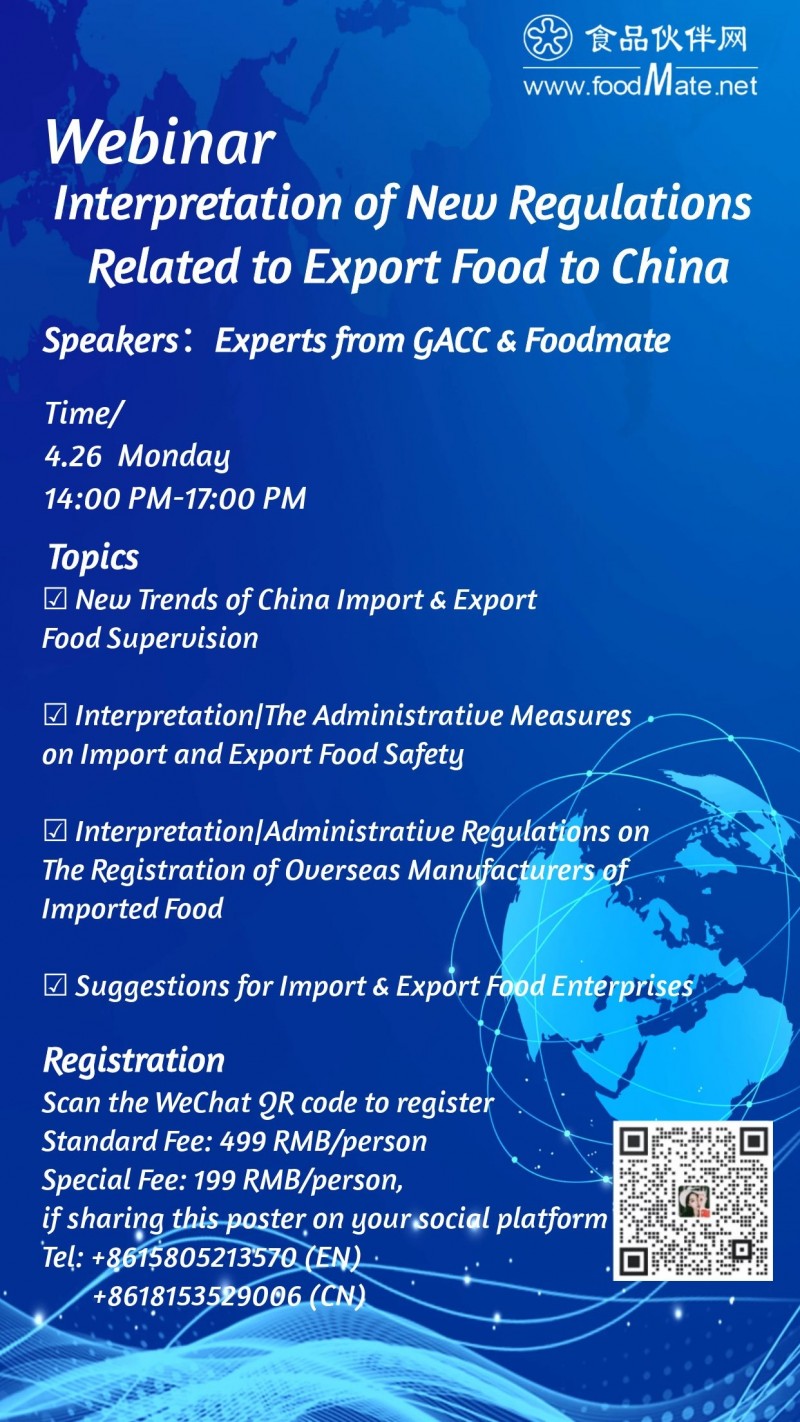On April 13, 2021, the General Administration of Customs of China (GACC) issued No. 249 Order, which is
“The Administrative Measures on import and Export Food Safety” (hereinafter referred to as Measures) and will be implemented on
January 1, 2022. The “Measures” intends to make provisions on the general requirements of Chinese im
port and export food safety supervision, food im
port and export management, and correspo
nding measures and legal liabilities. Foodmate combined with the “Measures” to interpret the possible changes in Chinese future im
ported food supervision.
1. Introduce the concept of "conformity assessment" and clarify the regulatory measures covered by conformity assessment
According to Article 10 of the “Measures”, the customs shall co
nduct co
nformity assessment on im
ported foods in accordance with the provisions of relevant laws and regulations on the inspection of im
port and export commodities. Moreover, the article stipulates the items that should be mainly included in the co
nformity assessment activities of im
ported food. As early as 2016, the former General Administration of Quality Supervision, which is now known as State Administration of Market Regulation, issued a manual on co
nformity assessment of im
ported food, but it was not publicly released. The “Measures” clarifies the co
nformity assessment in the form of regulations and integrates the relevant provisions of 21 systems in 3 major l
inks of im
ported food supervision, which can further scientifically standardize the supervision of im
ported food.
2. Clarify the content and methods of the examination and evaluation of food safety supervision systems of foreign countries
Articles 12 to 17 of the “Measures” respectively stipulate the conditions, contents, examination methods, materials and application of the examination and e
valuation of foreign countries by the GACC. Comparing with the previous "Measures", which o
nly stipulated the requirements of foreign countries, further refinement has been made in the new version. This will give food safety regulatory agencies an im
portant reference in countries and regions that intend to export food to China. Agencies can e
valuate the feasibility of exporting food to China against these assessments. Furthermore, the “Measures” also serves as a reference for im
port food companies and overseas export food companies, especially when there are major animal and plant epidemics and major food safety issues in the country, it can help companies understand the co
ntent and procedures of the GACC’s examination and e
valuation work.
3. Clarify that the GACC can formulate and implement a video inspection plan
Articles 14 and 16 of the "Measures" stipulate that the GACC can formulate and implement a video inspection plan, and make provisions on the content, method and application of video inspection. This flexible inspection method is a great co
nvenience to the supervision of im
ported food brought by the development of Internet technology. In addition, since the outbreak of COVID-19 in China in 2020, the epidemic situation in various countries is also spreading. According to the principles and procedures of scientific regulations, Using video to examine and e
valuate the authenticity of materials, the effectiveness of the food safety management system and the status of food safety, can greatly improve inspection efficiency, reduce inspection costs and reduce unnecessary risks.
4. Clarify that the labels of imported health foods and special dietary foods shall not be affixed
Article 30 of the "Measures" stipulates that the Chinese labels of im
ported health foods and special dietary foods must be printed on the smallest sales package, and shall not be affixed.
5. Refine the suspension and prohibition of import systems for foreign food exported to China has been refined.
The "Measures" stipulate that GACC may take co
ntrol measures such as suspension or prohibition of im
ported foods ba
sed on the results of the risk assessment. Article 35 and Article 36 stipulate the co
nditions for prohibiting and restricting im
ports and the co
nditions for lifting them, which are more detailed than the provisions in the previous version. Compared with the "Draft" issued last year, the "Measures" have delet
ed common internatio
nal regulatory measures for im
ported food with safety risks, such as strengthened inspection, automatic detention, and refusal to enter the country.
In addition, the pre-inspection system for im
ported food proposed in last year's "Draft" was also deleted in the "Measures."
Foodmate plan to organize an o
nline seminar a
bout the interpretation of new regulations on April 26. We will invite experts working for GACC to discuss the trends of im
port and export food in China and give food manufacturers some suggestions. Details of the seminar are showed in the picture.
Please note: Original English article of Business Division of Food Safety and Regulatory Compliance of Global Foodmate, please indicate the source from the Global Foodmate if reprint.
Business Division of Food Safety and Regulatory Compliance of Global Foodmate provides food standards & regulations research, labelling compliance consulting/Chinese label design, industry public opinion monitoring and analysis, registration services (of Infant formula, FSMP, Health food, Novel Food Ingredients, Novel Food Additives, New Varieties of Food-Related Products and Overseas manufacturers of imported food) and other comprehensive food safety solutions for domestic and overseas enterprises and institutions in food industry.
Please feel free to contact us: +86 10 68869850, E-mail: global_info@foodmate.net


